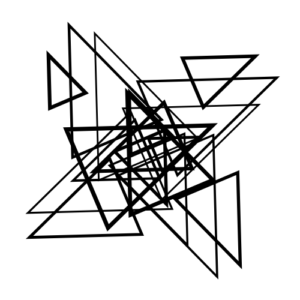Anons at the Gate: “The nature of the shadow is equated with the unknown, and with chaos itself. A chaos that is always on the brink of returning once more. Only now we live in an even more precarious position, because as [Jordan] Peterson correctly asserts, in the age of disenchantment, after the ‘Death of God,’ or the functions of meaning the metaphysical served us, we are left still without ground. We exist in a fragile social strata whose tranquility can be disrupted by chaotic forces at any time. Only now there is no clear delineation of exteriority or interiority. Friend or enemy. The chaos from without in terms of hordes at the gates ‘resembles heretics from within’ the social strata. Interiority is just as precarious as the chaos of the unknown, for all of the archetypal sources of meaning and authority have been thrown into a chaotic mix.”
Code Beast — the Terminal Stage is Simulation: “The initial seed for Code Beast, besides [Applied Ballardianism]’s final chapter, was a strange encounter I had on Twitter in 2013 with a very weird type of spambot that I have never seen since. The writer Ken Hollings also encountered these bots, which he called ‘non-people.’ For Hollings, they were akin to the voices of the dead that people have claimed to hear in the static of radios, TVs and appliances: that is, Electronic Voice Phenomenon (EVP). Hollings said that the non-people were digital ghosts that roamed Twitter looking for the living to latch onto, an insight that to this day chills me to the bone.”
Into the Desert, Into the Woods: “Too much focus on the darkness and you can forget about the existence of light. Aldous Huxley summed up the problem in The Devils of Loudon:
No man can concentrate his attention upon evil, or even upon the idea of evil, and remain unaffected. To be more against the devil than for God is exceedingly dangerous. Every crusader is apt to go mad. He is haunted by the wickedness which he attributes to his enemies; it becomes in some sort a part of him.
“In every human life, the underworld has to be negotiated. You can’t avoid the journey into what Dante called ‘the dark wood’ of your interior. There are things in there that you need to find and face. But at some point you have to find your way out again, or you are in trouble. You end up walking round and round in circles in the thickets, raging at the darkness, imagining you are moving forward. You need to start heading out and up.”

Reading Well: “You should start many books and complete few. You should never feel beholden to completing them, there are simply too many worthwhile works to read. You should re-read the books you adore. With a second reading you will realize just how much you have forgotten, how much you have absorbed, and how much you simply missed the first time, just like you miss any detail of life without repetition. I think this more important than any other suggestion. When you have found a masterpiece, you should reread it just as you would revisit a beloved foreign land, or a faraway friend.”
The Everlasting Man: “What the devil is Paul talking about when he says that if we visit prostitutes we are making Christ visit prostitutes. How can Jesus say that if we clothe the naked and feed the hungry then we have somehow clothed and fed him? Why do we say The Church is Christ’s ‘body’ and in what sense are we God’s children and Christ’s brothers? Why are sinners sent to Hell? None of these questions make sense if you spiritualize the Bible. The don’t make any sense at all. But the moment you stop turning everything into an allegory and dare to believe the text means what it says all of it snaps into place.”
The Industrial Revolution Never Happened: “Our received wisdom about modernity blocks us from asking a vital question that helps resolve the tensions held by the left and the right, evidenced everywhere in the magisterial relics of the ancient world: what can we build today that will redound for generations, for millennia?”
